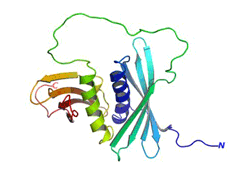
| Serial No. | GA-P0045HU |
| Species | Human |
| Specification | 0.1 mg/0.2mg |
| Brand | GenAsia |
| Origin | Shanghai |
| Price | US$350/US$620 |
Detailed information
1 Host: Escherichia coli (E. coli)
2 Species: Human
3 Protein Type: Recombinant
4 Synonyms: CHK1, Chk1, rad27, C85740, CHEK1, chk1, id:ibd2720, zgc:56093, An08g10320, AO090003000441
5 Purity: 95% by SDS-PAGE
6 Application: WB、 Elisa、 Functional Studies
7 Background:
CHK1 is a 56 kDaserine/threonine protein kinase that was originally identified in fission yeast to play a role in activation of the DNA damage checkpoint in the G2 phase of the cell cycle (1). CHK1 appears to function downstream of several of the known fission yeast checkpoint gene products, including that encoded by rad3+, a gene with sequence similarity to the ATM gene mutated in patients with ataxia telangiectasia (2). In vitro, CHK1 binds to and phosphorylates the dual-specificity protein phosphatases Cdc25A, Cdc25B, and Cdc25C, which control cell cycle transitions by dephosphorylating cyclin-dependent kinases (3). CHK1 phosphorylates Cdc25C on serine-216 which creates a binding site for 14-3-3 protein and inhibits function of the phosphatase. Thus, in response to DNA damage, CHK1 phosphorylates and inhibits Cdc25C, thereby preventing the activation of the Cdc2-cyclin B complex and mitotic entry.
8 Storage&Stability:
Avoid repeated freeze and thaw cycle.Store at 2-8℃ for delivery and store at -20 or -70℃ for future use. The loss rate of the target protein which describes the stability was determined by accelerated thermal degradation test.That is to incubate the protein at 37℃ for 48h and no obvious degradation and precipitation were observed.The loss of this protein is less than 5% within the expiration date under appropriate storage condition.
2 Species: Human
3 Protein Type: Recombinant
4 Synonyms: CHK1, Chk1, rad27, C85740, CHEK1, chk1, id:ibd2720, zgc:56093, An08g10320, AO090003000441
5 Purity: 95% by SDS-PAGE
6 Application: WB、 Elisa、 Functional Studies
7 Background:
CHK1 is a 56 kDaserine/threonine protein kinase that was originally identified in fission yeast to play a role in activation of the DNA damage checkpoint in the G2 phase of the cell cycle (1). CHK1 appears to function downstream of several of the known fission yeast checkpoint gene products, including that encoded by rad3+, a gene with sequence similarity to the ATM gene mutated in patients with ataxia telangiectasia (2). In vitro, CHK1 binds to and phosphorylates the dual-specificity protein phosphatases Cdc25A, Cdc25B, and Cdc25C, which control cell cycle transitions by dephosphorylating cyclin-dependent kinases (3). CHK1 phosphorylates Cdc25C on serine-216 which creates a binding site for 14-3-3 protein and inhibits function of the phosphatase. Thus, in response to DNA damage, CHK1 phosphorylates and inhibits Cdc25C, thereby preventing the activation of the Cdc2-cyclin B complex and mitotic entry.
8 Storage&Stability:
Avoid repeated freeze and thaw cycle.Store at 2-8℃ for delivery and store at -20 or -70℃ for future use. The loss rate of the target protein which describes the stability was determined by accelerated thermal degradation test.That is to incubate the protein at 37℃ for 48h and no obvious degradation and precipitation were observed.The loss of this protein is less than 5% within the expiration date under appropriate storage condition.








